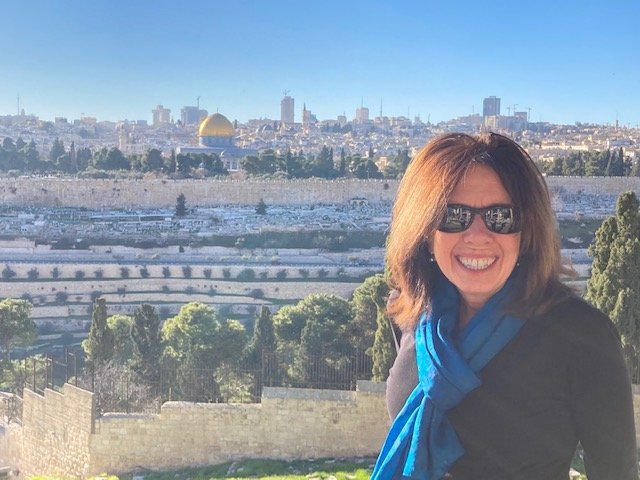Dr. Julie Faith Parker on the Virginia Theological Seminary Pilgrimage
Dr. Julie Faith Parker is Professor of Biblical Studies and Associate Dean for Academic Affairs at General Theological Seminary.
Ancient time, sacred space, beloved Scripture, and enduring faith all take on new meaning when one experiences the Holy Land.
This past January, I joined with twenty-three students and alumni from Virginia Theological Seminary on a two-week pilgrimage to Israel/Palestine. I was delighted when Dean Knowles invited me to accompany the group as the professor for the students’ pilgrimage course. I truly enjoyed getting the know the smart and spirited members of the VTS community on this trip! St. George’s College, the Anglican center in East Jerusalem, became our Holy Land home, providing expertise, guidance, and abundant hospitality to create a meaningful and memorable experience.
As those who have been on a pilgrimage know, these trips are an odd and delightful mix of contradictions. We are both pilgrims and tourists. The sites are sacred and secular. What we may have envisioned as simple, serene places in Jesus’ life have become ornate and often contested sites of veneration . . . and conflict. Many a pilgrim gets on the plane with lofty, idealistic hopes of being drawn into Jesus’ world, but once on the ground quickly becomes disillusioned with the centuries of expensive piety and political contention that have been heaped on holy sites.
And yet . . .
To go on a pilgrimage is to allow oneself to know the land, places, air, and culture that have descended from the time of Abraham and Sarah to Jesus to ours, on their own soil. What we see and hear and feel and touch and taste tug us into the biblical world, where insights gleaned from towns and turf await to be discovered.
As a Bible scholar, I was glad to share knowledge that related to biblical places. For example, when our bus passed by the fields of Tekoa, home of the prophet Amos, we saw the flat, lush plains of green. I explained that our English Bibles generally describe this prophet as “among the shepherds of Tekoa” (NRSV). Yet the Hebrew word for “shepherd” is roeh; in this verse, Amos 1:1, we have the term noqed. The only other time noqed appears in the Hebrew Bible is in 2 Kings 3:4, designating the King Mesha of Moab who gives “the one hundred thousand lambs, and the wool of one hundred thousand rams” to the King of Israel. Indeed, the word noqed is translated as “sheep breeder,” not “shepherd” in 2 Kings 3:4 (NRSV). Seeing this verdant land helped us envision Amos as a rich sheep breeder—the region could sustain many small cattle. Amos was not a lowly, humble shepherd, but a powerful dealer in animals. His prophecies are filled with anger against the rich for caring about themselves and their rituals, but not about those who suffer from poverty. Amos was rich himself and writes about a world he knew firsthand.
Experiencing biblical lands firsthand is a gift that adds dimension to our understanding of the Bible and the faith it bequeaths to us. I am so grateful for the chance to have experienced this time in Israel/Palestine with new friends from VTS. As our two schools live into our partnership, such ventures offer one way that we can share in the joys of learning and theological formation.




